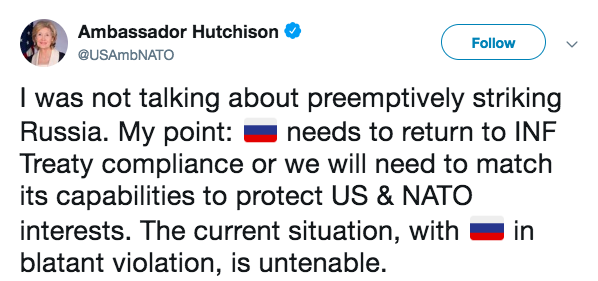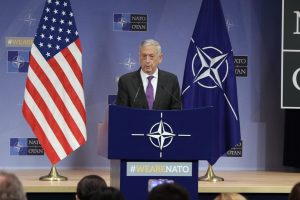ΣΧΟΛΙΟ ΙΣΤΟΛΟΓΙΟΥ : Η δική μας πρόβλεψη είναι ότι αντί να χτυπηθεί το Ν.Α.Τ.Ο με την Ρωσία... θα δούμε το έργο απο την ανάποδη, δηλαδή οι Κινέζοι με τους Ρώσσους, σύντομα θα έχουν κάποιου είδους αναμέτρηση.Ας μην βιαστούν να γελάσουν μερικοί.....

Ambassador Kay Bailey Hutchison told NATO allies that the United States was committed to a diplomatic solution to resolving the long-running dispute over the Intermediate-Range Nuclear Forces Treaty, but if Russia continues its development of the banned missiles, “at that point we would then be looking at a capability to take out a missile that could hit any of our countries in Europe and hit America in Alaska.”
Hutchison underscored the US was committed to deterrence, and not preemption, and the option of choice would be getting Russia to halt the testing of the intermediate-range missiles. But potential counter measures would include the option “to take out the missiles that are in development by Russia in violation of the treaty,” she said. “They are on notice.”
She later sent a Tweet clarifying her intent, explaining she was not talking about strikes:

The Obama and Trump administrations
have complained to Russia about violations of the treaty, which bans
American and Russian ground-launched ballistic or cruise missiles
capable of flying 300 to 3,400 miles, since 2014, when Obama sent a letter to Russian President Vladimir Putin informing him of US intelligence concerning the breach.
But Hutchison’s comments Tuesday were the first time a high-ranking US official indicated that the Pentagon might consider anything more than diplomatic action, should the Russian missiles become operational.
“We have looked into this
intelligence and we are extremely concerned,” NATO Secretary-General
Jens Stoltenberg told reporters at the kickoff of the two-day meeting of
NATO allies at alliance headquarters in Brussels.
The treaty “is in danger because of Russia’s actions,” Stoltenberg said, adding, “all Allies agree that the most plausible assessment would be that Russia is in violation of the treaty. It is therefore urgent that Russia addresses these concerns in a substantial and transparent manner.”
At issue is a new Russian missile system, called 9M729, which is thought to have a range that falls squarely within the banned distances laid down by the 2987 treaty.
Defense Secretary Jim Mattis is in Brussels for the NATO meeting, along with other defense ministers from across the alliance. A NATO official told me that the issue of Russia’s INF violation will be a topic of discussion during the two-day meeting.
“We have been trying to send a
message to Russia for several years that we know they are violating the
treaty. We have shown Russia the evidence that we have, that they are
violating the treaty,” Hutchinson said. “We know they have violated the
treaty and we are beginning the research capabilities that are allowed
by the treaty to deter a medium-range ballistic missile.”
The Pentagon, State Department, and National Security Council have not responded to Breaking Defense‘s request to comment on the ambassador’s remarks.
Russia has also long complained that the United States is violating the treaty, pointing to the Aegis Ashore missile interceptor sites in Romania, and soon Poland, as being capable of launching Tomahawk missiles. The sites, US and NATO officials counter, only house defensive weapons and not any treaty-busting offensive missiles. Moscow has also said that armed US drones like the Predator and Reaper violate the treaty, because they could be considered ground-launched weapons.
But the Pentagon is preparing to move beyond the treaty. The Nuclear Posture Review, released in February, confirmed that the Pentagon has started research on a ground-launched intermediate missile system that would violate the 30-year-old treaty if it were fielded. The initial research remains strictly within the bounds of the treaty, Pentagon officials insist.
The US Army has also started work< on an intermediate range, ground-launched missile, which Army officials told Breaking Defense is also fair game under existing rules.
“We need to demonstrate to the Russians that we’re serious about them coming back into compliance with INF and that perhaps they need to be reminded why they signed the INF treaty in the first place,” Greg Weaver, the Joint Staff deputy director of strategic capabilities, told reporters when releasing the report.
Some critics of the treaty complain that it doesn’t include other countries, like China, who remain free to build nuclear and conventional ground-launched ballistic and cruise missiles with ranges of 500 to 5,500 kilometers.
Then- Pacific Command chief — and now Ambassador to South Korea — Adm. Harry Harris told Congress earlier this year that the treaty is “self-limiting,” particularly since “over 90 percent of China’s ground-based missiles would violate the treaty.”
ΠΗΓΗ

US Ambassador to NATO Kay Bailey Hutchison sent a warning to Moscow about violating the INF treaty -- one that NATO allies appear prepared to back up.
WASHINGTON: The US ambassador to NATO said Tuesday that the Trump administration is prepared to “take out” Russian missile systems that violate a Cold War-era treaty, using some of the most strident language to date to describe Washington’s complaints about the weapons.Ambassador Kay Bailey Hutchison told NATO allies that the United States was committed to a diplomatic solution to resolving the long-running dispute over the Intermediate-Range Nuclear Forces Treaty, but if Russia continues its development of the banned missiles, “at that point we would then be looking at a capability to take out a missile that could hit any of our countries in Europe and hit America in Alaska.”
Hutchison underscored the US was committed to deterrence, and not preemption, and the option of choice would be getting Russia to halt the testing of the intermediate-range missiles. But potential counter measures would include the option “to take out the missiles that are in development by Russia in violation of the treaty,” she said. “They are on notice.”

But Hutchison’s comments Tuesday were the first time a high-ranking US official indicated that the Pentagon might consider anything more than diplomatic action, should the Russian missiles become operational.
The treaty “is in danger because of Russia’s actions,” Stoltenberg said, adding, “all Allies agree that the most plausible assessment would be that Russia is in violation of the treaty. It is therefore urgent that Russia addresses these concerns in a substantial and transparent manner.”
Defense Secretary Jim Mattis is in Brussels for the NATO meeting, along with other defense ministers from across the alliance. A NATO official told me that the issue of Russia’s INF violation will be a topic of discussion during the two-day meeting.
The Pentagon, State Department, and National Security Council have not responded to Breaking Defense‘s request to comment on the ambassador’s remarks.
Russia has also long complained that the United States is violating the treaty, pointing to the Aegis Ashore missile interceptor sites in Romania, and soon Poland, as being capable of launching Tomahawk missiles. The sites, US and NATO officials counter, only house defensive weapons and not any treaty-busting offensive missiles. Moscow has also said that armed US drones like the Predator and Reaper violate the treaty, because they could be considered ground-launched weapons.
But the Pentagon is preparing to move beyond the treaty. The Nuclear Posture Review, released in February, confirmed that the Pentagon has started research on a ground-launched intermediate missile system that would violate the 30-year-old treaty if it were fielded. The initial research remains strictly within the bounds of the treaty, Pentagon officials insist.
The US Army has also started work< on an intermediate range, ground-launched missile, which Army officials told Breaking Defense is also fair game under existing rules.
“We need to demonstrate to the Russians that we’re serious about them coming back into compliance with INF and that perhaps they need to be reminded why they signed the INF treaty in the first place,” Greg Weaver, the Joint Staff deputy director of strategic capabilities, told reporters when releasing the report.
Some critics of the treaty complain that it doesn’t include other countries, like China, who remain free to build nuclear and conventional ground-launched ballistic and cruise missiles with ranges of 500 to 5,500 kilometers.
Then- Pacific Command chief — and now Ambassador to South Korea — Adm. Harry Harris told Congress earlier this year that the treaty is “self-limiting,” particularly since “over 90 percent of China’s ground-based missiles would violate the treaty.”
ΠΗΓΗ

Δεν υπάρχουν σχόλια:
Δημοσίευση σχολίου